Compare Shopify search vs AI-powered search for fashion retail. Discover which drives more revenue through better product discovery and trend awareness.
by YesPlz.AIOctober 2025
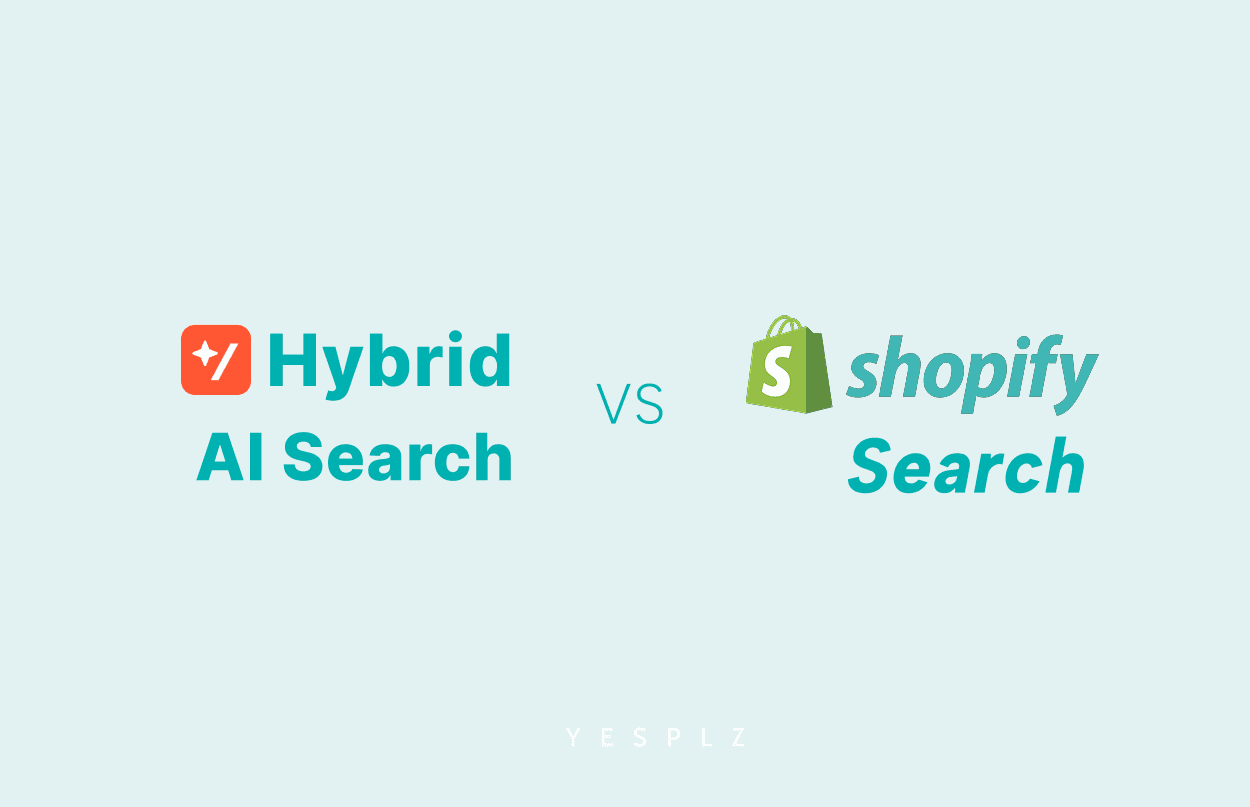
You launched your store on Shopify and chose its built-in search for its simplicity. No technical headaches, just straightforward functionality that lets you focus on running your business. But as visitors start exploring your store, you notice something off: Shopify search misses relevant products, even when your catalog has perfect matches.
 You know the solutions: manually add synonyms, enrich product data, update tags for popular search terms. Yet, between managing inventory, fulfilling orders, and handling customer service, when exactly are you supposed to find time for constant search optimization? Meanwhile, data shows that fashion eCommerce generates 30 - 40% of total revenue from onsite search. You can’t just abandon this revenue channel.
You know the solutions: manually add synonyms, enrich product data, update tags for popular search terms. Yet, between managing inventory, fulfilling orders, and handling customer service, when exactly are you supposed to find time for constant search optimization? Meanwhile, data shows that fashion eCommerce generates 30 - 40% of total revenue from onsite search. You can’t just abandon this revenue channel.
So you turn to the Shopify App Store, scrolling through dozens of search apps. They all promise better results, but how do you determine which is best for your store? Is there a search solution that truly delivers more accurate results without adding to your already heavy workload?
As a fashion retailer or eCommerce manager, you need a clear answer. That’s why this fashion search technology comparison matters. We'll examine Shopify search vs. AI-powered search to uncover which one truly understands how fashion shoppers search and which actually delivers the results they're looking for.
Table of Contents:
Shopify search provides an easy, ready-to-use solution that serves millions of online stores. Its technology is based on basic keyword matching that indexes product titles and descriptions.
This solution excels in simplicity. Retailers can launch their stores with functional search capabilities immediately. No setup or technical expertise is required. It handles basic queries efficiently.
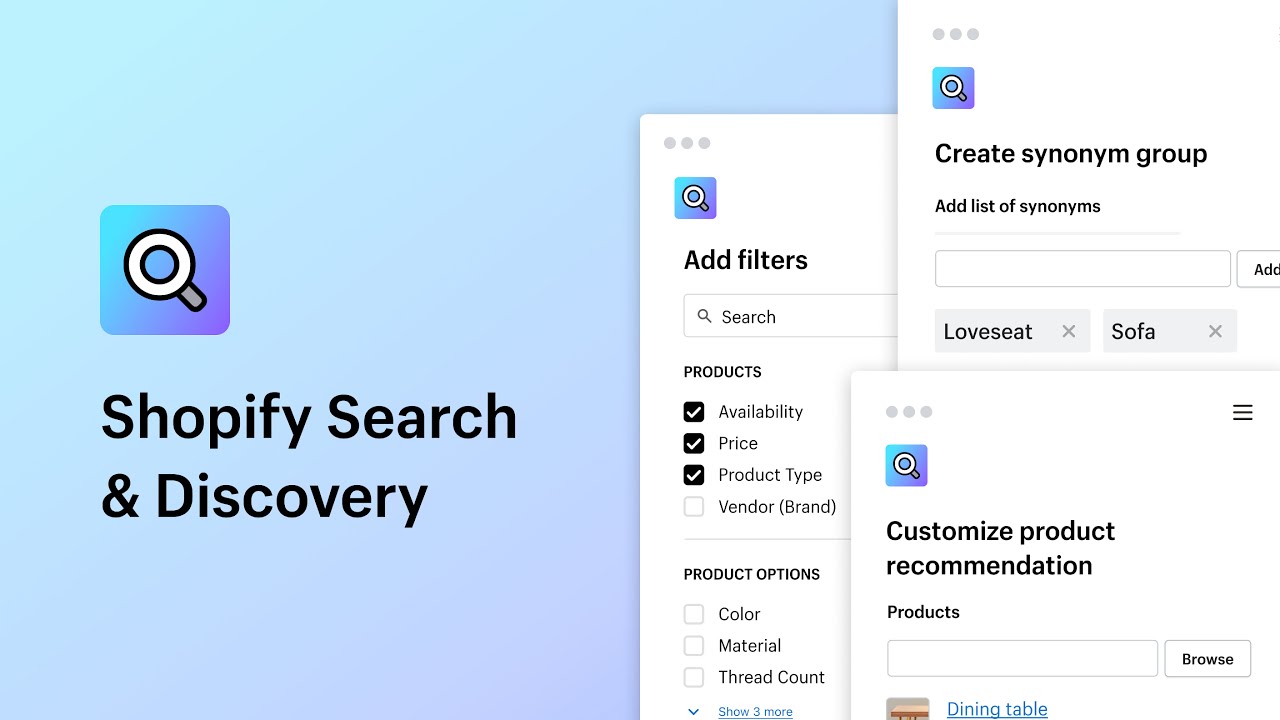 The integration with Shopify’s filtering system allows shoppers to refine results by availability, price, type, brand, color, and other standard attributes. For stores with limited inventories and shoppers who already know what they want, Shopify search offers adequate functionality.
The integration with Shopify’s filtering system allows shoppers to refine results by availability, price, type, brand, color, and other standard attributes. For stores with limited inventories and shoppers who already know what they want, Shopify search offers adequate functionality.
However, this simplicity doesn't always translate into higher revenue. In fashion eCommerce, accurate search results and superb keyword optimization directly impact conversion rates. These are areas where basic keyword matching falls short.
For fashion retailers, the simplicity of Shopify quickly becomes a liability. Two major limitations stand out: the rapid evolution of the fashion world and the heavy manual workload it places on retailers.
Shopify’s keyword-based approach begins to show cracks in the fast-moving world of fashion. It struggles to interpret the contextual, trend-driven language fashion shoppers naturally use. Queries like “Y2K but elegant” or “office outfits that aren’t boring” often return poor results. The system has no concept of occasions, vibes, styles, or current trends. It simply matches words.
Shopify also has difficulty recognizing synonyms. Products titled “pants” won’t necessarily appear for a “trousers” search. Spelling mistakes often lead to zero results. And, the system lacks understanding of fashion hierarchies or product relationships. Since it operates on static product data, retailers must constantly update typos, keywords, synonyms, and fashion tags. Otherwise, queries containing buzzwords or trendy terms, as in those above examples, are likely to fail. This ongoing maintenance keeps the search experience a step behind fashion’s rapid evolution.
Maintaining effective Shopify search requires significant manual effort from shop owners. To improve search performance, you need to:
Manually Add Product Boosts: Select individual products to promote and input search terms for each one. This requires anticipating which keywords shoppers might use and repeating the process for every product you want to feature.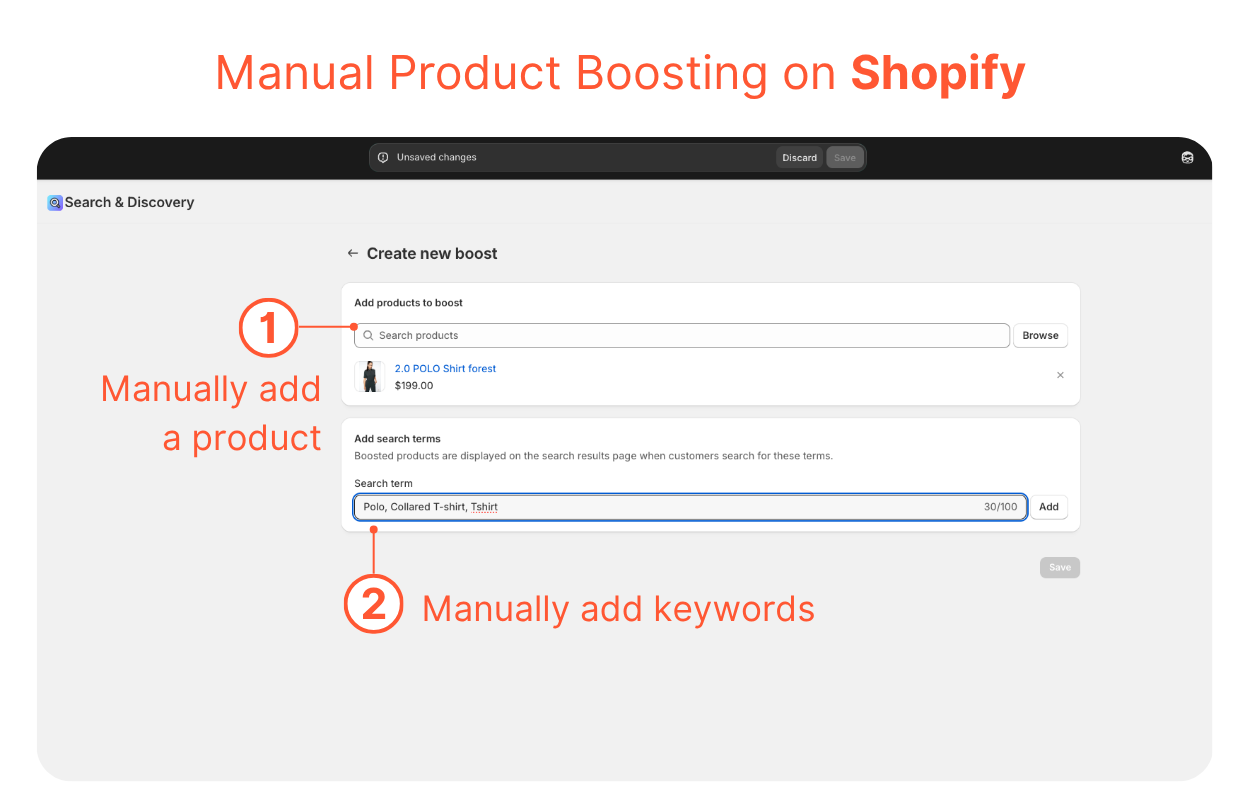
Manually Create Synonym Groups: Build synonym lists to help your shoppers find relevant results. Put "pants" and "trousers" into the same group, for example. It is therefore clear to the system that both terms refer to the same category of product.
Continuously Update Product Tags: As fashion trends evolve, manually update tags to reflect new buzzwords and trending terms. Or, risk shoppers seeing zero results for these searches.
YesPlz hybrid AI search takes a different approach to product discovery. Unlike Shopify, it’s purpose-built for the complexity of fashion eCommerce. The engine uses a sophisticated hybrid architecture. It combines multiple AI technologies to understand both product attributes and shopper intent at a deeper, more human level. It thus eliminates the manual work burden through intelligent automation while still giving you full control when you want it.
At its core, YesPlz integrates multi-layered technologies that work together to deliver more relevant fashion results:
Hybrid Search combines text and semantic search. It therefore understands context from both text and product images, specifically tailored to the fashion industry. A query "navy color tops" returns tops in various blue shades, including navy, cobalt, royal blue, sky blue, etc. Or, when a shopper searches “cute summer outfits with wide pants,” YesPlz understands the request involves: Coordinating multiple products (tops and bottoms), applying seasonal context (summer), filtering by style (cute) and silhouette (wide pants).
Image Tagging automatically analyzes product images to extract over 1,100 fashion-specific attributes, including patterns, materials, silhouettes, necklines, sleeve types, embellishments, etc. There is no need to manually tag your products since the AI handles this automatically for your entire catalog.
Auto Keyword Management continuously learns from shopper behavior to maintain an updated search keywords library. This management extends to category synonyms, popular slang terms, brand-specific variations, and common misspellings. For example, "Calvn Klein" or “Calvin Kline” should show "Calvin Klein" results.
What sets YesPlz apart is intelligent automation that eliminates time-consuming repetitive tasks. Search optimization happens automatically in the background, saving you hours of manual work while delivering more accurate results.
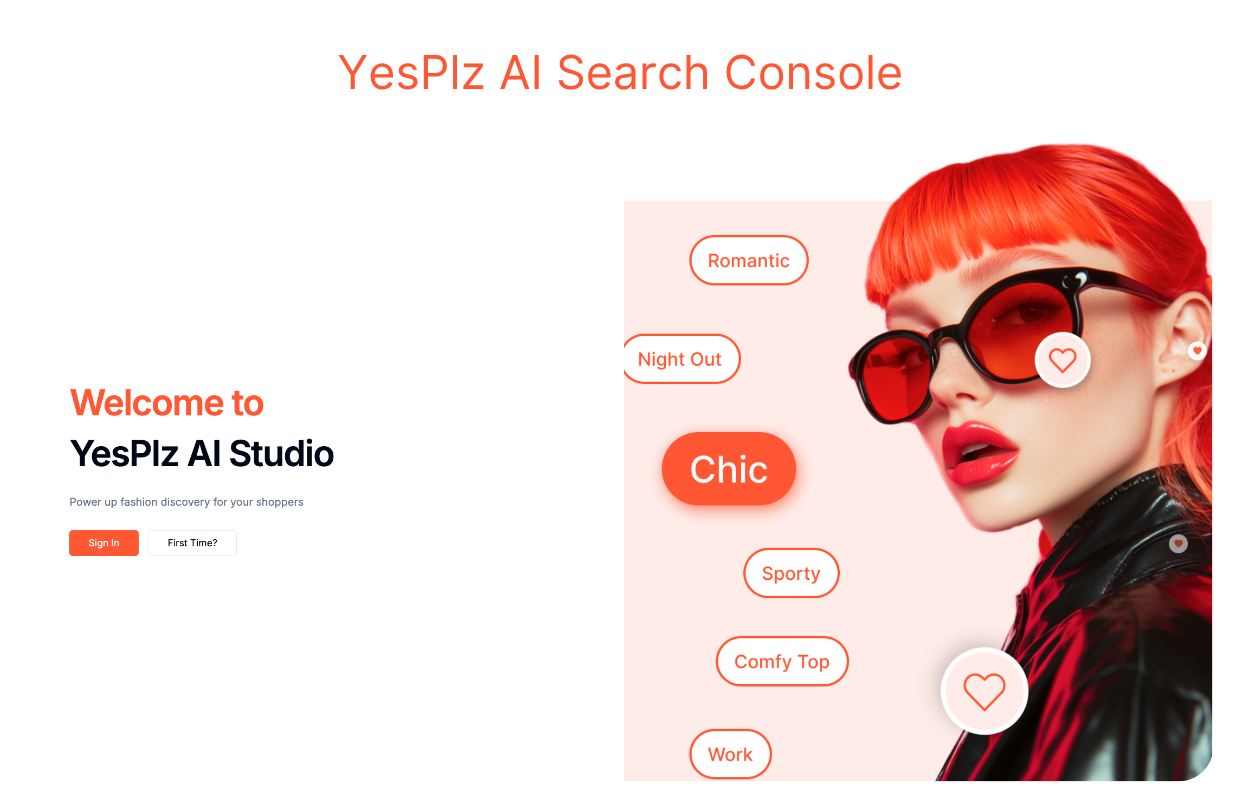 When you log into YesPlz AI Studio, you’ll immediately see the difference from Shopify’s manual approach. This comprehensive dashboard is a place where critical search optimization tasks are already handled automatically.
When you log into YesPlz AI Studio, you’ll immediately see the difference from Shopify’s manual approach. This comprehensive dashboard is a place where critical search optimization tasks are already handled automatically.
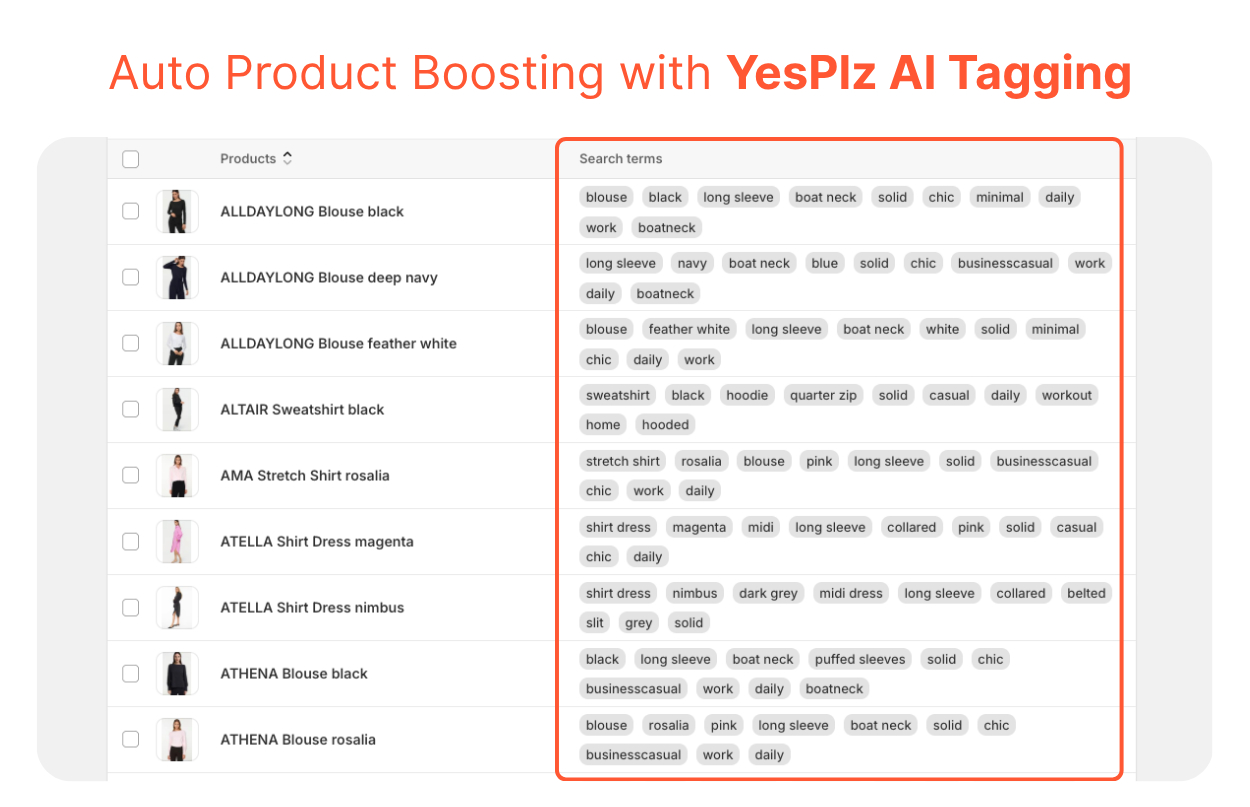 Unlike Shopify, where you boost products one by one, YesPlz automatically does the task for you. If you need merchandising control, simply adjust parameters like Brand Ranking, Size Availability, or Price Points using intuitive sliders. Promote a specific brand? Set the weight. Prioritize a certain size or a price point? Configure the preference. Products matching your criteria automatically rise to the top.
Unlike Shopify, where you boost products one by one, YesPlz automatically does the task for you. If you need merchandising control, simply adjust parameters like Brand Ranking, Size Availability, or Price Points using intuitive sliders. Promote a specific brand? Set the weight. Prioritize a certain size or a price point? Configure the preference. Products matching your criteria automatically rise to the top. 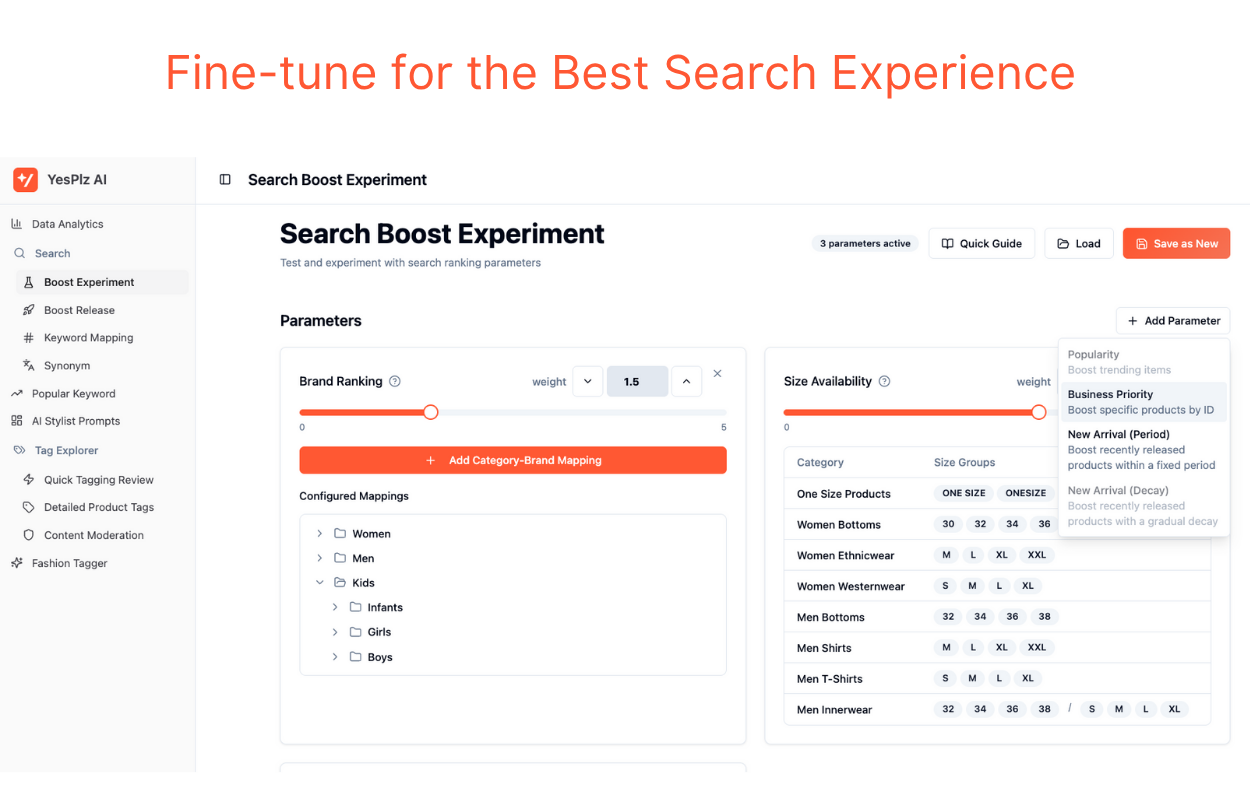 The system also automatically populates and maintains synonym groups for you. You can browse the auto-generated library and edit if needed. But the heavy lifting is already done. In addition, it tracks search terms shoppers actually use and maps them intelligently, eliminating the guesswork Shopify requires.
The system also automatically populates and maintains synonym groups for you. You can browse the auto-generated library and edit if needed. But the heavy lifting is already done. In addition, it tracks search terms shoppers actually use and maps them intelligently, eliminating the guesswork Shopify requires.
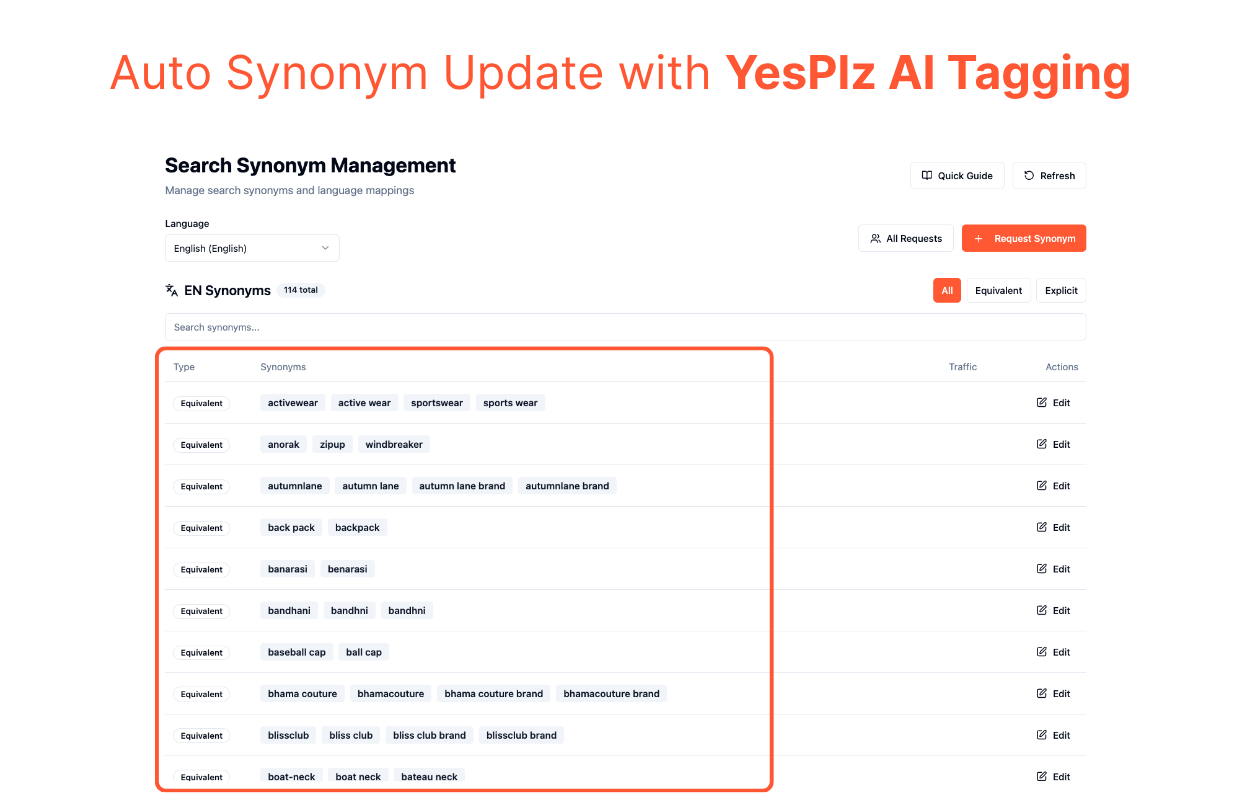 Key Feature Comparisons: Shopify Search vs AI-Powered Search and Filtering
Key Feature Comparisons: Shopify Search vs AI-Powered Search and FilteringThe difference between Shopify search vs AI search becomes clear when we compare them feature by feature. The table below breaks down how each system performs across key areas that influence product discovery, shopper experience, and revenue.
| Feature | YesPlz Hybrid AI Search | Shopify Search |
| Search Quality | Delivers high-accuracy results by understanding fashion context and shopper intent. | Matches keywords without grasping meaning or context. Indexing product descriptions without cleaning the data often leads to irrelevant results. |
| Search Features | Offers auto-complete, recommended search terms, popular and trending searches, and recent search history. | Includes only basic keyword search functionality. |
| Search Boosting | Automatically promotes products, enriches search keywords and tags, and updates the synonym library. | Manually boosts products, adds synonyms, and updates tags. |
| UI Optimization | Allows full UI customization that aligns with your store theme. | Offers minimal UI customization. |
| Complex Queries Handling | Understands and accurately answers multi-attribute and styling-related queries, delivering relevant results that match shoppers’ intent. | Offers limited support for complex queries; often returns zero, incomplete, or irrelevant results because it lacks advanced embedding and contextual understanding for fashion. |
| Typos and Misspellings | Detects, corrects, and interprets shopper intent accurately. Automatically manages frequent typos. | Often fails to return results when typos occur. Requires merchants to update the frequent typos. |
| AI Tagging | Auto-tags product images by mood, style, occasion, and trending keywords to enhance search results and filtering options. | Relies on manual tagging updates. |
| Integration Effort | Simple API setup process supported by the YesPlz AI team | Built-in with Shopify; no additional setup required. |
From the Shopify search vs AI search comparison table, it’s clear that Shopify offers simplicity and ease of setup. It is ideal for small or straightforward product catalogs. Meanwhile, YesPlz AI-powered search brings deep fashion intelligence to the table. It accurately understands fashion search queries, whether it’s complex, natural language, mismatched keywords, or typos, powered by multi-modal search.
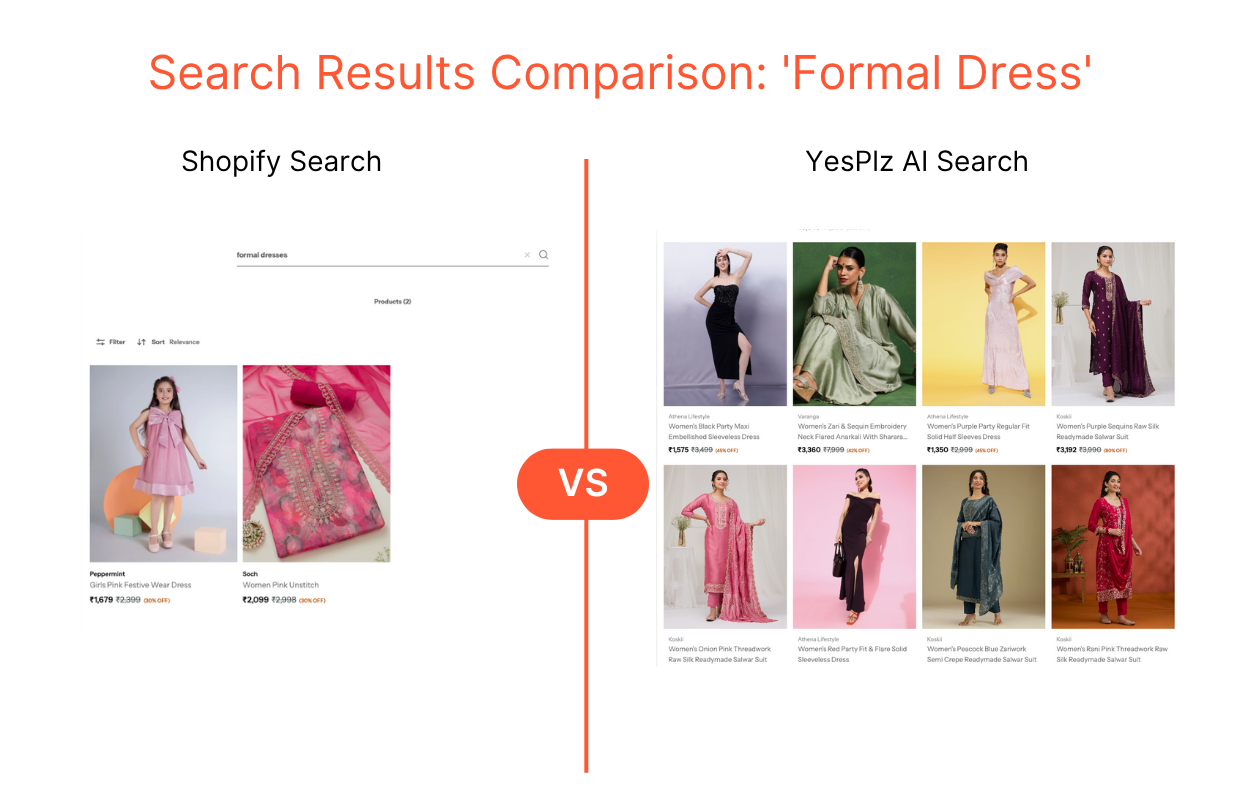 For fashion retailers seeking to improve discovery, engagement, and conversions, YesPlz delivers a highly fashion-optimized search engine. So, your shoppers can find what they're looking for and complete purchases, instead of leaving frustrated.
For fashion retailers seeking to improve discovery, engagement, and conversions, YesPlz delivers a highly fashion-optimized search engine. So, your shoppers can find what they're looking for and complete purchases, instead of leaving frustrated.
By combining multi-layered search techs, YesPlz empowers fashion retailers to deliver highly personalized, intuitive, and efficient shopping experiences. The benefits go beyond search accuracy. They directly influence shopper satisfaction, operational efficiency, and long-term business growth.
Whether shoppers type precise fashion terms or conversational language, they can find exactly what they envision. As a result, engagement and conversion rate increase significantly. Retailers leveraging AI-driven search report major uplifts. In our experience, we’ve seen search-to-click rates climb from 30% (versus an industry average of 37%) to 55~60%, alongside higher search-to-cart rates.
Irrelevant results represent immediate revenue loss. Hybrid AI search dramatically reduces these conversion-killing moments. It understands shopper intent even when exact keyword matches don’t exist, ensuring shoppers always see relevant products. For instance, when a shopper searches for “white tank top,” the system returns perfect matches, even if no product titles and descriptions contain those exact words. Instead of bouncing to competitors, shoppers stay engaged and explore.
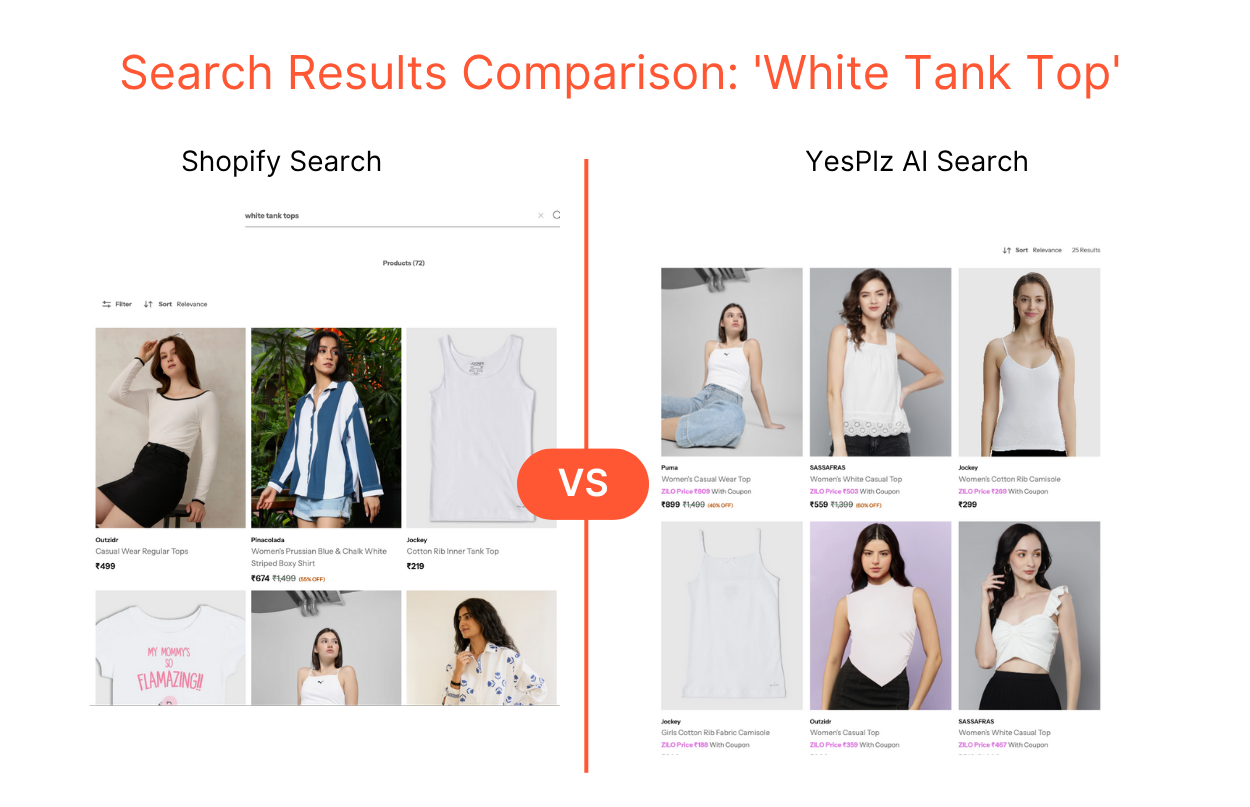 Operational Efficiency for Retailers
Operational Efficiency for RetailersRepetitive tasks such as manually boosting products, adding synonyms, updating frequent typos, and tagging attributes can drain merchandising resources. AI-powered search automates these tasks. It thus saves countless hours for fashion retailers. The time saved translates to reduced labor costs and faster time-to-market for new inventory.
Fashion trends evolve overnight. So, fashion retail search solutions must keep pace. When “quiet luxury” or “demure looks” trends go viral, the AI-based search instantly identifies and surfaces matching items. This responsiveness allows retailers to capitalize on trend moments when shopper interest and purchasing intent peak, often within days of a trend emerging. This trend-aware, context-rich approach gives a competitive edge for retailers who use AI search. You capture peak shopper interest and sales while your competitors lag, still updating keywords.
Shopify search works well for basic, keyword-focused needs. However, for fashion retailers seeking a more accurate search engine that drives sales from a search query, hybrid search is the better choice. Even basic search performance requires constant search keyword optimization. Fashion-trained AI is the best for the job, relentlessly optimizing keywords for your eCommerce website.
YesPlz AI-powered search stands out as the most powerful choice for fashion eCommerce. By combining semantic understanding, visual AI, trend monitoring, and fashion-specific training, it understands fashion intent, visual context, and emerging trends. The engine helps shoppers discover products naturally while boosting conversions and engagement for retailers.
If you’re exploring Shopify search alternatives that convert search queries to orders, book a demo with YesPlz to experience the difference.

Written by YesPlz.AI
We build the next gen visual search & recommendation for online fashion retailers
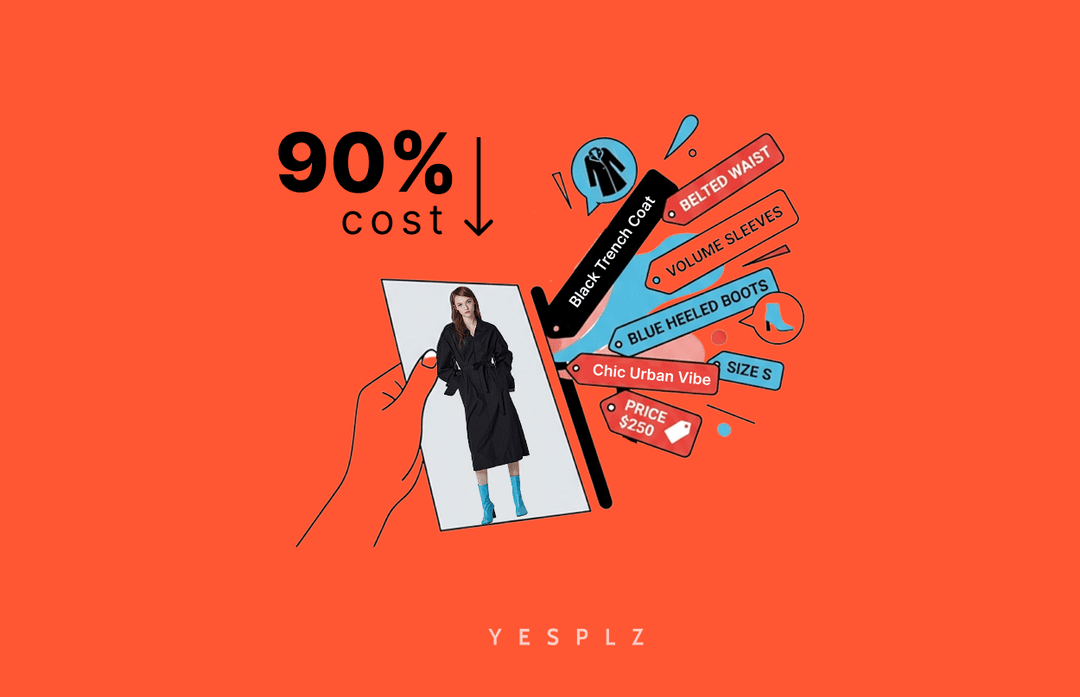
Inconsistent tags hurting sales? Self-service product tagging delivers accuracy and speed without enterprise prices. Tag products 10x faster at 90% lower cost.
by YesPlz.AI
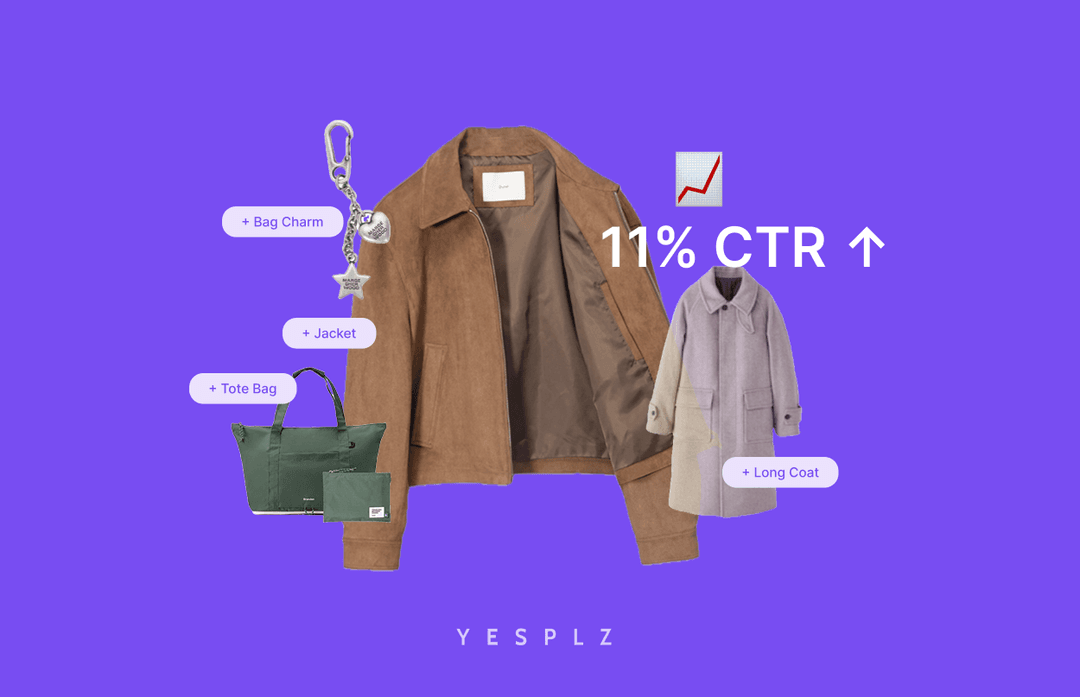
We analyzed 13,374 fashion searches. AI tagging increased product discovery by 22% and boosted clicks by 11%. Here’s what the data revealed.
by YesPlz.AI